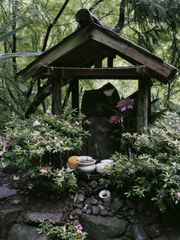
The Tsukuyomi Shrine is a former Japanese Shinto Shrine inside the deep forests of Asian Island.
History[]
The legend goes that shortly after the first inhabitants of Asian Island settled-in, small groups of geographers moved inland to record the geography of the island. One of the first notable discoveries made occurred in the dead of night, as explorers of Japanese ethnicity discovered a small waterfall flowing over a large peak. The most fascinating aspect of the waterfall, however, was a moonbow situated overhead. Having never seen such phenomena before, the group was awe-struck, and returned to their village with exaggerated tales.
The water flowing downstream was clean and suitable for drinking. Interpreting this as some sort of sign, more settlers moved inland, into the woods near the waterfall. The populace built a small shrine to the lunar deity of Shinto and Japanese mythology, Tsukuyomi-no-Mikoto besides the waterfall.
On most nights, the moonbow was visible, and villagers would often gather to spectate. The settlement thrived for about a decade, until the moonbow did not appear for a full month. Villagers began to worry. Their fears only grew, after the morning settlers headed down to the stream to gather drinking water and found the stream was dirty and contained large globs of mud. After a week of this, the water slowed to a halt. The villagers were forced to relocate in search of another water source.
At first, the myth was believed to have been an exaggeration, after scientists initially ruled out the possibility that a moonbow could have appeared in the area. At first glance, it seemed as though such a setting couldn't support such phenomena. After over a century, however, scientists believe they have finally pieced together the science behind the legend.
Back in the time of the settlement, when water flowed in the streams and sprayed out into the air, a moonbow could possibly have appeared. After nearly a decade, however, water erosion caused the stream to veer in a different direction. For a while, mud would have flowed down into the settlement, before having came to a halt altogether. In this time, a moonbow would not, likely, have appeared.
